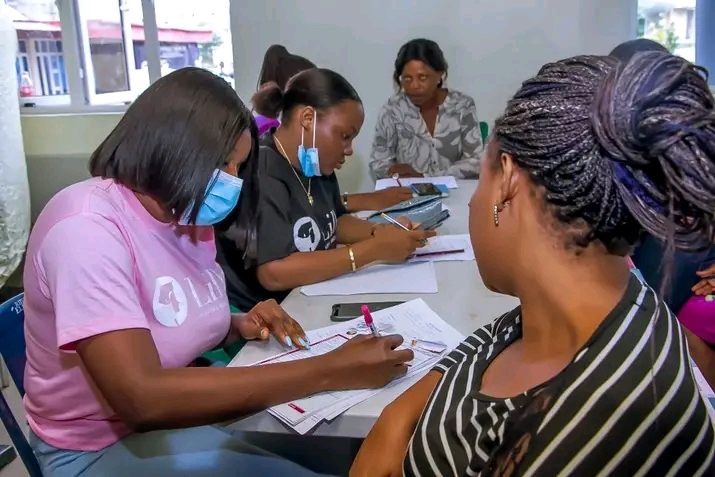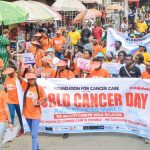Things started falling apart for 33-year-old David Udo when in 2020 he observed that tumours were growing around his eye and jaw.
In early 2021, he underwent a test at the Ahmadu Bello University Teaching Hospital (ABUTH), Zaria, Kaduna State, the result, which showed that the tumor was cancerous.
Udo would lose his job because the cancerous lumps kept festering and this made him very unproductive.
Then, he began to receive medical attention at the hospital; the first treatment he underwent was chemotherapy – a drug treatment that uses powerful chemicals to kill fast-growing cells in the body. This is delivered under six cycles at an interval of 3 weeks. Each of these cycles costs around N40,000.
With all his savings gone, he had to depend on his wife and a few of his friends to cover the cost of the treatments. Notwithstanding the treatments, the tumour ruptured, leading to uncontrollable bleeding.
“The treatment seemed to have been effective but after a while, the problem kept getting worse. I was then referred to the National Hospital Abuja to undergo radiotherapy, a cancer treatment that uses high doses of radiation to kill cancer cells and shrink tumours” said Udo, while conversing with BONews.
Regrettably, the radiotherapy equipment at Abuja hospital were not working—a testimony to the fallen state of health care in the country.
He was, thereafter, referred to the Lagos University Teaching Hospital (LUTH) Cancer Center where he was informed that radiotherapy would cost the sum of N787,000.
With no job and dependency on handouts from a few individuals, how would he afford that sum of money? This question left him devastated and according to him, “depressed and tired of life.”
According to the WHO, cancer is the rapid creation of abnormal cells that grow beyond their usual boundaries, and which can then invade adjoining parts of the body and spread to other organs.
“Human beings are made up of cells, and the cells grow and die. But when someone has cancer it means that the cells begin to grow abnormally in the body. And this could result in death,” said Dr Oge Illegbune Lakeshore, a doctor at the Lakeshore Cancer Center in Lagos.
A report by the American Society of Clinical Oncology shows that in Nigeria over 124,815 people were diagnosed with different forms of cancer in 2020. And about 72,000 Nigerians lose their lives to cancer annually.
If detected early cancer can be treated effectively, however, the cost of treatments is still very expensive and out of reach for an average Nigerian.
A report by dataphyte, a media research and data analytics organisation, shows that chemotherapy and radiotherapy costs between N600,000 to N1.5 million per session. Cancer drugs are also expensive costing as much as N300,000 per month.
This is a fortune when contrasted against the average monthly living wage for an individual in Nigeria which is a paltry sum of just N43,000.
Hope shines in the dark
Sometimes in 2021, distraught Udo was scrolling through his instagram feeds when he stumbled upon the Foundation for Cancer Care. He clicked on the page and found out the foundation could actually help him pay for the radiography treatment he badly needed.
Without wasting time, he sent a message and one of the officials handling the page responded to his message. From instagram, the conversation continued on WhatsApp where he passionately laid bare his challenges and the foundation promised that if his case was genuine they would seek funds to cover the cost of his treatment in Lagos.
And sooner than he expected a doctor at LUTH informed him that the cost of the radiotherapy had been covered by the nonprofit. A week after the radiation therapy, the tumour started shrinking and he stopped bleeding.
Cancer cells can disrupt organ function and may destroy healthy cells in organs which can result in death.
The removal of the tumours refueled the hope of survival in him. Mr Udo is now continuing follow-up treatments at ABUTH, Kaduna.
Saving cancer patients’ lives through kindness
The Foundation for Cancer Care is a non-profit organization committed to enhancing cancer care and prevention in Nigeria. Since its establishment, it has continued to provide free cancer screening, diagnosis, and cancer treatment to identified patients from low socioeconomic communities.
Professor Chummy Nwogu, a US-based medical doctor, founded the nonprofit in 2008 with a group of experts who were interested in enhancing cancer care in West Africa.
“We started the foundation with the primary objective to construct a cancer care centre (Lakeshore Cancer Centre) in Lagos, promotion of cancer awareness, screening and prevention, cancer patient advocacy, capacity building measures for health practitioners and fundraising to assist cancer patients to pursue treatments,” Nwogu told BONews.
The Lakeshore Cancer Center is Nigeria’s first operational private clinical care facility solely dedicated to cancer care and prevention.
On how beneficiaries are selected, the founder said after applications are received, the organisation would adopt a stringent process, to select only indigent patients, who obviously cannot afford the cost of radiography treatments.
So far, the foundation has conducted free cancer screenings for over 4,000 people, trained over 1,500 medical professionals in various capacities, engaged over 35 organisations in different cancer initiatives and provided funding for radiotherapy to eight cancer patients.
One of them is Mr. Anthony Okerafor. The Lagos-based 76-year-old man told BONews that he could not afford the treatment for radiography when he was diagnosed with cancer in 2021.
However, a doctor LUTH, where he had gone for treatments, reached out to the Foundation for Cancer Care to help him secure funds to pursue his treatment. Luckily for him, the request was granted.
“After some tests, I was asked to pay the sum of N1 million for radiotherapy. I was confused because I didn’t know how to raise that kind of money.
“A doctor helped me to contact the nonprofit and they helped me with the sum of N460,000. My children were able to raise the balance. I am really grateful for that kind gesture.”
Speaking further, he noted that his doctor informed him that the treatment was successful.
Mental health of cancer patients matters too
Apart from funding treatments for cancer patients, the nonprofit also provides mental health support to patients traumatised by cancer.
It is estimated that 20,000 cancer patients are at risk of severe mental health disorders because of cancer diagnosis, and less than two percent of these patients have ever received any professional psychological support after cancer diagnosis and during treatment.
“The Dewdrops Support Group consists of over 100 cancer survivors from our clinic, Lakeshore Cancer Center. The foundation coordinates this group and we have quarterly meetings through which we are able to provide support to survivors,” said Ms. Tolulope Adeyoola-Oladipupo, the Programs Coordinator.
The group was created to create a safe space for survivors to receive support and encouragement from one another and open to anyone battling with cancer and anyone who is willing to join.
Does cancer have a cure?
According to the American Cancer Society, cancer has a cure but it depends on the type and stage of the cancer, the type of treatment they can get, and other factors. Some cancers are more likely to be cured than others.
“About a third of cancer can be prevented or cured. It is wrong to believe that cancer is a death sentence. Cancer could also be managed so that the quality of life will improve.
“We just need to encourage people to go for regular cancer screenings,” said Professor Nwogu.
But there are tons of challenges
Despite its zeal to improve the quality of life of cancer patients, the nonprofit efforts are frustrated by a host of so many challenges; the chief of which is funding.
“Funding to be able to assist with care at different levels is one of our biggest challenges because our funds come from donors and crowdfund,” Professor Nwogu said.
Another prominent challenge is also infrastructure limitations. Nigeria currently only has four functional cancer treatment centres, which is not enough to treat the immense number of Nigerian citizens who suffer from cancer.
Nigeria reportedly has only three public cancer treatment centres and in a population of more than 200 million, there are only nine radiation therapy machines.
Cultural and religious beliefs could also be barriers to getting treatment. Many Nigerians kick against the organisation’s plea to get tested for cancer.
Despite all the challenges the Foundation for Cancer Care is poised to make a difference.
And what can we learn?
Providing help to cancer patients is indeed a huge task but one step forward is a giant one that can save lives and make a big difference in homes. For Mr. David Udo, who stepped on the thin line between life and death, Foundation for Cancer Care has given him a reason to live again.
“I had lost hope. Imagine what would have happened if the nonprofit did not sponsor my radiography treatments. I’m eternally grateful for what they did,” he said.
This story has been made possible by Nigeria Health Watch with support from the Solutions Journalism Network, a nonprofit organization dedicated to rigorous and compelling reporting about responses to social problems.
This story was first published on www.BONews.com









